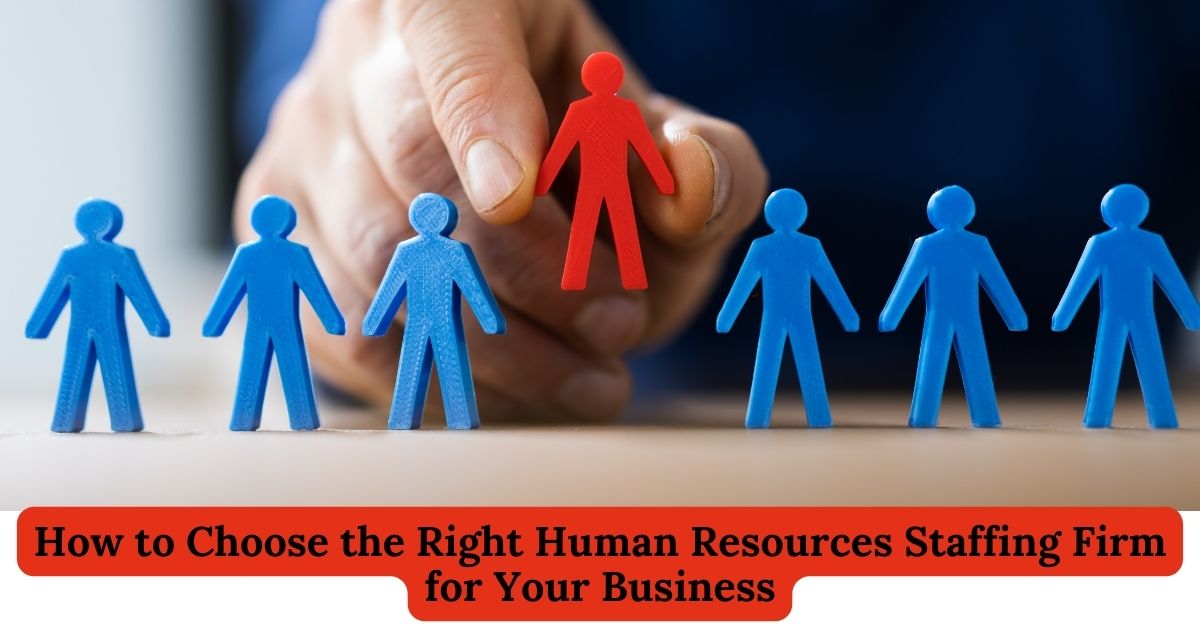
In the fast-paced business world, finding the right talent is crucial to success. That’s where a Human Resources (HR) staffing firm can make a world of difference. But with so many options out there, how do you select the one that best aligns with your business needs? In this guide, we’ll delve into the essential steps and considerations for choosing the right human resources staffing firm for your business. Let’s get started!
1. Understanding Your Needs
To make an informed decision, you must first understand your specific HR needs. Whether it’s temporary staffing, permanent recruitment, or specialized industry knowledge, clarifying your requirements is the initial step in the selection process.
2. Identifying Your Industry
Different industries have unique HR demands. Ensure the firm you choose has experience and expertise in your industry. Industry-specific knowledge can streamline the recruitment process and yield better results.
3. Evaluating Reputation and Trustworthiness
Reputation matters. Research the firm’s track record, client testimonials, and online reviews. A reputable HR staffing firm should be transparent about its success stories and client satisfaction rates.
4. Assessing Expertise and Experience
Look for firms with a proven track record of success. Experienced recruiters are more likely to understand your needs and find the right candidates quickly.
5. Technology and Tools
Modern HR firms use cutting-edge technology and tools to enhance the hiring process. Inquire about their software, applicant tracking systems, and data analytics capabilities.
6. Cultural Fit
Consider whether the staffing firm’s values and culture align with yours. A cultural fit can lead to smoother collaborations and better outcomes.
7. Cost and Fees
Understand the fee structure. Some firms charge a percentage of the employee’s salary, while others have fixed fees. Make sure the pricing aligns with your budget.
8. Contract Terms
Review the contract carefully. Pay attention to the termination clause, candidate replacement policy, and any hidden fees. A clear contract protects your interests.
9. Client References
Ask for client references and reach out to them. This firsthand information can provide valuable insights into the firm’s performance.
10. Interview Process
Inquire about the firm’s interview process. A comprehensive screening and interview process ensures that candidates are well-vetted before reaching your desk.
11. Diversity and Inclusion
Diversity is key to a thriving workplace. Ensure that the HR firm values diversity and has a strategy for promoting it in your organization.
12. Compliance and Regulations
HR regulations vary by region. Ensure the firm is well-versed in local labor laws and compliance requirements.
13. Communication
Effective communication is vital. Choose a firm that keeps you updated throughout the hiring process and is responsive to your needs.
14. Flexibility
Business needs can change rapidly. Opt for a firm that can adapt to your evolving HR requirements.
15. Track Record of Placements
Ask for data on the firm’s past placements. This can give you an idea of the caliber of candidates they source.
16. Reporting and Analytics
Inquire about the reporting and analytics they provide. Data-driven insights can help you make strategic HR decisions.
17. Client Retention Rate
A high client retention rate often indicates client satisfaction. Check if the firm has long-term relationships with its clients.
18. Handling Difficult Situations
Discuss how the firm handles challenging situations like candidate dropouts or disputes. Their problem-solving approach is crucial.
19. Industry Networks
A firm with an extensive network in your industry can tap into valuable connections for your benefit.
20. Scalability
Consider your future growth plans. Ensure the firm can scale its services to accommodate your expanding workforce.
21. Ethics and Values
Choose a firm that shares your ethical values. Ethical alignment can prevent conflicts down the line.
22. International Expertise
If you have global operations, inquire about the firm’s international staffing capabilities.
23. Employee Satisfaction
Happy employees are productive employees. A firm that prioritizes candidate satisfaction is more likely to find the right fit for your team.
24. Security and Data Protection
Data security is paramount. Ensure the firm follows strict data protection protocols.
25. Client Support
Lastly, assess their client support. You want a firm that provides ongoing support, not just during the recruitment phase.

How to Choose the Right Human Resources Staffing Firm for Your Business
Now that we’ve covered the essential aspects of selecting an HR staffing firm, it’s time to put your knowledge into action. Remember, the right firm can elevate your business by providing top-tier talent. Take your time, do your research, and choose wisely.
Frequently Asked Questions
1. What are the benefits of using an HR staffing firm? HR staffing firms streamline the hiring process, provide access to a broader talent pool, and often save you time and money in the long run.
2. How do I determine my specific HR needs? Evaluate your current HR challenges, workforce size, and growth projections. This will help you define your requirements.
3. What questions should I ask when interviewing HR staffing firms? Ask about their experience, industry knowledge, recruitment strategies, and client success stories.
4. Is it better to choose a local or national HR staffing firm? The choice depends on your needs. Local firms may have a better understanding of the local job market, while national firms have a broader reach.
5. Can I negotiate fees with an HR staffing firm? Yes, many firms are open to fee negotiations. It’s worth discussing your budget and expectations upfront.
6. What should I do if I’m not satisfied with the candidates provided by the firm? Discuss your concerns with the firm. They may offer replacements or adjustments to meet your expectations.
Conclusion
Choosing the right Human Resource Recruiting Firms is a critical decision for your business’s success. By following these guidelines and considering your unique needs, you can confidently select a partner that will help you build a high-performing team. Remember, investing time in this decision now can lead to long-term benefits for your organization.

